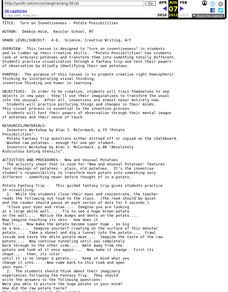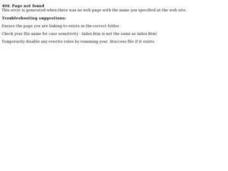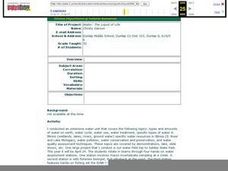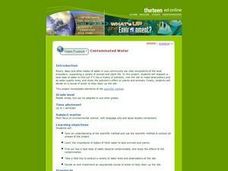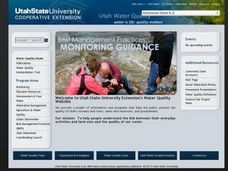Curated OER
Turn on Inventiveness
Students practice visualization through a fantasy trip and test their powers of observation by blindly identifying their own potatoes.
Curated OER
Time Train
Learners are read a short book "Time Train" by Paul Fleischman. Using the text, they identify the clues to let them know the train is traveling back in time. They make a time line of the trip and make a cutout of meat-eating and...
Curated OER
Keeping Cool
Students investigate the air conditioner units around the school. They chart the temperature by placing a thermometer in different situations and decide how to keep cool and save energy in the summer.
Curated OER
Sea World Fieldtrip Follow-up
Students create a graphic organizer in preparation for a web page about a specific science-related topic. This lesson is used as a follow-up to a field trip experience and can be adapted for many different subjects.
Curated OER
Going to Greenland
Students play game in which they identify different-colored objects to take on an imaginary trip.
Curated OER
Hawaii's Migratory Animals
Students act as travel agents to plan a trip for a migratory animal. They conduct research and design a travel brochure that includes a migratory route, illustrations of planned stopovers and special tourist attractions the animal might...
Curated OER
Water: The Liquid of Life
Sixth graders complete a lesson on the properties, types and amounts of water on Earth. In groups, they travel between stations to identify water resources in Illinois and pollution sources. They complete the lesson with a field trip...
Curated OER
Amazing -- Saturn Is So Far Away!
Students work together to create a scale model of the distances between the planets. They write a paragraph to describe Saturn and their make-believe trip to the planet. They identify other characteristics of Saturn as well.
Curated OER
Bugsicles (A Frozen Insect Larva You can Find!)
Students explore how animals survive in the winder. After attending a gall-collecting field trip, students place them in a freezer. Once frozen, the students open the gall flay larva and observe it as the larva revives. Students...
Curated OER
Exploring Great Salt Lake
Fourth graders go on a field trip to make observations about plants in the Great Salt Lake area. They make observations about the environment and record the types of pants that are living there. The lesson is to introduce the concepts of...
Curated OER
Identification of Wildfire/Structure Interfaces, Risk Assessment of Structures, and Risk Management
Students participate in a class discussion about wildfire and urban interfaces as well as risk of wildfire in the area in which they live. After reviewing a wildfire/urban interface fire safety checklist, a walking field trip is...
Curated OER
Classify Forces
Third graders compare and contrast the forces of pushing and pulling. As a class, they take a field trip around the school and write down any action they see and any object that is motionless. In groups, they use magazines to cut out...
Curated OER
Graphing Water Temperature
Students graph water temperature using probe software and a Palm on a class field trip to a lake or pond. Emphasis is placed on collaboration with high school science students and the use of ImagiProbe software.
Curated OER
Mapping a Stream
Students map an actual local waterway. They create full color scale drawings that include windfalls, plant cover, streambed composition, and landmarks such as trees, boulders, and slumps. This is a long-term project that involves...
Curated OER
Fuel Cells
Students examine how fuel cells and combustion engines work. Using the internet, they research the positives and negatives of the various energy sources. In groups, they complete an experiment with a working fuel cell model and take a...
Curated OER
Contaminated Water
Young scholars review and use the steps in the scientific method to complete the experiment. In groups, they research the importance of water to plants and animals in their local area. They examine how water can become contaminated and...
Curated OER
Anolis Lizards of the Greater Antilles
Students "take a trip" to the Greater Antilles to observethe Anolis lizards. They study the body structures and habitat of different species, then plot this data on a map to look for patterns in their distribution. From the patterns they...
Curated OER
Writing About Estuaries
Students use the internet to research an aspect of interest to them about the Tijuana Estuary. After the unit on the estuary is completed, they reflect on their experiments and thoughts in a paper. They also participate in a field trip...
Curated OER
Bell Live! The Great Lakes: A Superior Adventure
Students participate in a virtual field trip to Lake Superior. In groups, they perform experiments in which test the level of toxins and bacteria in the water. They also watch video segments life in the lake and discuss their observations.
Curated OER
Fun with Balloons
Fifth graders design their own hot air balloon. In this science lesson, 5th graders investigate how factors like weight and sizes affect a balloon's lifting power. They also write math problems based on facts written in the...
Curated OER
Riparian Review
Students engage in the process of researching a riparian ecosystem. They conduct a field trip in order to obtain different types of data and work on measurement skills to analyze data to form a conclusion about the biotic factors of the...
Curated OER
Life on a Farm
Students take a field trip to a farm or observe pictures of farms and animals in the classroom. They paint a mural of a farm setting with animals. They practice phonetic skills with farm stories and songs. They explain how milk becomes...
Curated OER
Plot Studies
Third graders are introduced to how to properly read a plot map. As a class, they take a field trip to an area surrounding the school and work together in groups to examine small sections of the different environments. To end the...
Curated OER
Using PING to determine factors of Internet delay
Students use the concepts of PING to examine Internet delay. They discuss why PING is used in the Computer Science industry. They practice interpreting data as well.
